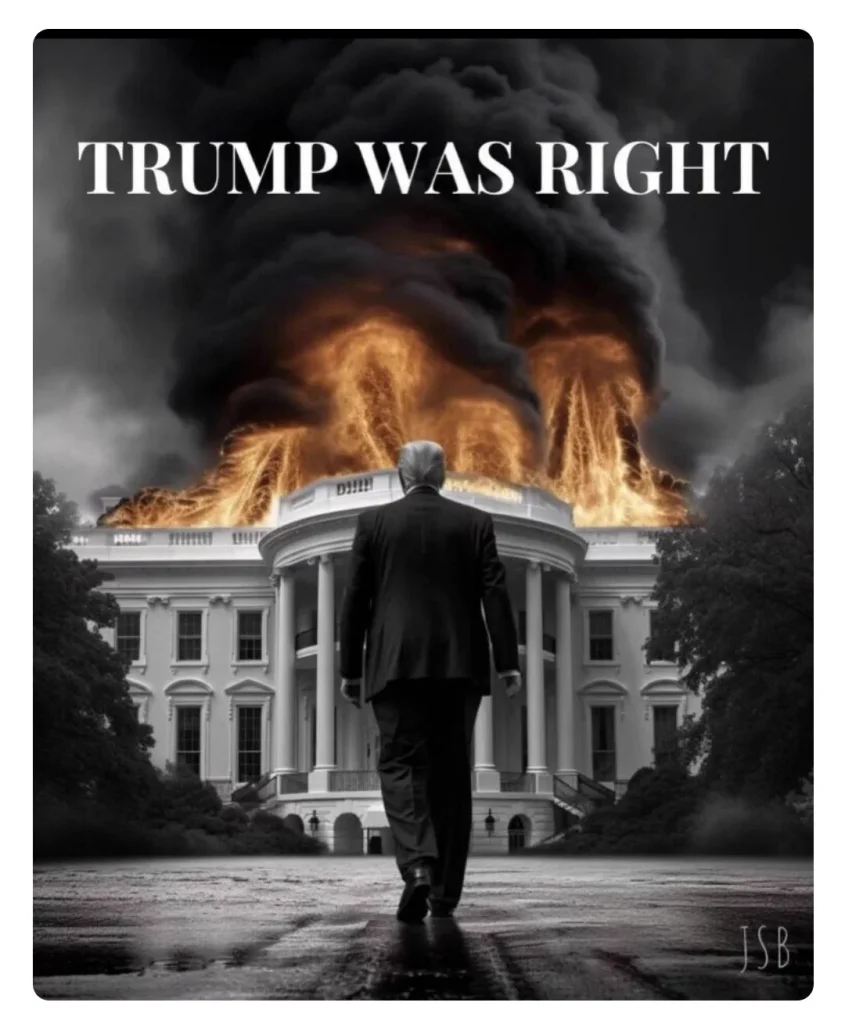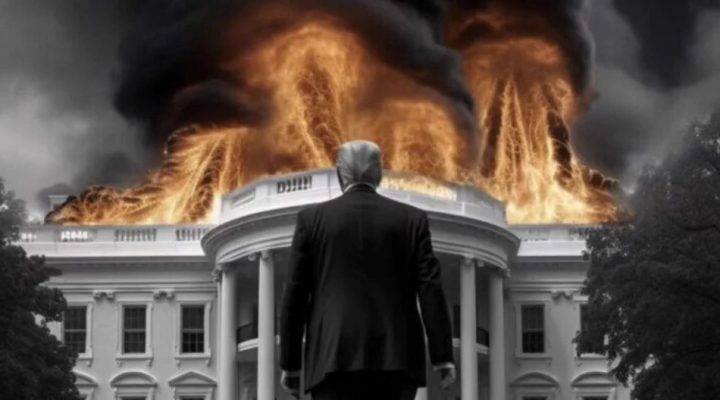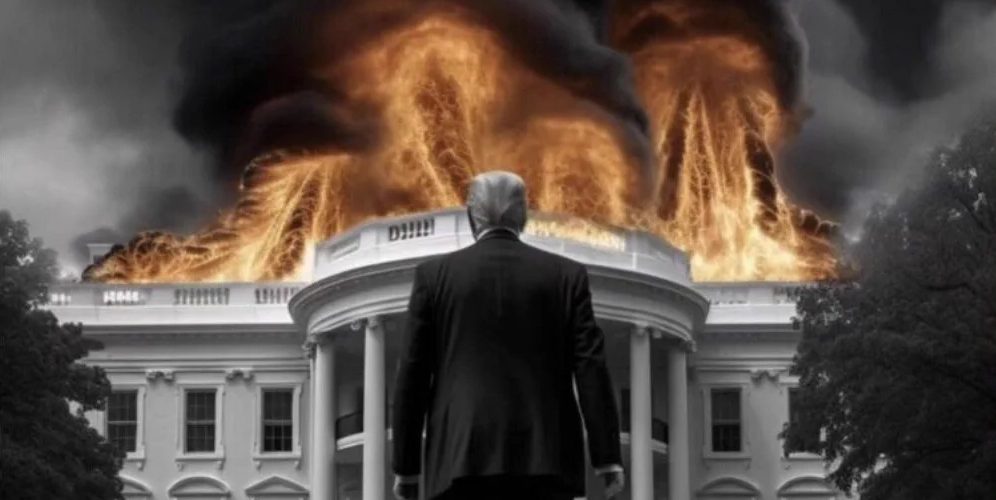Writing about Donald Trump has been a six-year cottage industry. Some observers say people are tired of Trump. This argument suggests writing about Trump only keeps him in the news cycle and does more harm than good. There’s merit to this line of thought.
I belong to the other school of reporting on Trump.
Here’s why: The danger is now. That is why I still write about Donald Trump. He is the incarnation of evil flying in the robes of a hypocritical, sold-out religious group loosely identified as evangelicals. He is a low-grade fascist, a demagogue, a renegade populist, a rhetorical pervert, a serial liar. He is a rhetorical arsonist who will not hesitate to light the fire and burn down the house of democracy.
In a July 4 message on his Truth Social platform, Trump posted an image of himself standing in front of a burning White House. This was not a scene from White House Down or Olympus Has Fallen. This was an unintended reality check on how far Trump will go to protect, not our country, but himself.

Between a coup and an insurrection
I cannot think of a time when I have been more upset and heartbroken than on January 6, 2021. Drinking even more coffee than usual, pacing the room, my eyes remained glued to the television as I watched and listened to President Trump incite his followers to march on the Capitol.
What he said went beyond the pale of sedition in my mind, but to his followers he was simply repeating the fact that the election had been unfairly “stolen” from him. Twenty-one times he used the word “fight.” To be fair, he did use the word “peace” one time. The crowd chanted, “Fight for Trump!”
What happened can only be described as something between a coup and an insurrection. Trauma and shock made understanding impossible. When Trump finally gave in to demands from his allies to issue a statement, he gave one of his usual non-committal statements. It was barely different from his “good people on both sides” statement after Charlottesville.
Trump, employing his favorite rhetorical trick, paralipsis, offered with one hand and took back with the other.
His mystical stereotyping, his syrupy sentimentality spoke of loving the domestic terrorists rummaging through the Capitol building. In a video, Trump spoke of them as special people. He called them “great patriots” and explained their criminal actions as “these are the things and events that happen when a sacred landslide victory is so unceremoniously and viciously stripped away from great patriots who have been badly and unfairly treated for so long. Go home in love and peace. Remember this day forever!”
Nothing he said was true. He lost the election. Decisively.
In recent speeches, Trump has indicated if he’s reelected he will pardon the people serving prison sentences for their criminal actions on January 6.
Mere prequel
As I sat glued to TV news that fateful day, I felt the wheels could come off the vehicle of democracy. I confess that on January 6, with a moody president oscillating between doing nothing and blaming the whole sordid affair on Speaker of the House Nancy Pelosi, I thought democracy had crashed and burned.
Then I realized January 6 was mere prequel to the next two years. The prequel, which we should have seen coming, has been explained by David Blight: “Yet Trumpism unleashed on January 6, and every day before and since over a five-year period, a crusade to slowly poison the American democratic experiment with a movement to overturn decades of pluralism, increased racial and gender equality, and scientific knowledge. To what end? Establishing a hopeless white utopia for the rich and the aggrieved.”
“To what end? Establishing a hopeless white utopia for the rich and the aggrieved.”
My reasons for writing about Trump are many. Trump is still a danger, a menace to democracy.
“I think our democracy is in trouble,” U.S. District Judge Reggie Walton said, “because, unfortunately, we have charlatans like our former president who doesn’t, in my view, really care about democracy and only about power.”
I am a dissident
Most of all, I write because I am a dissident, a dissident in the description offered by Vaclav Havel: “You do not become a ‘dissident’’ just because you decide one day to take up this most unusual career. You are thrown into it by your personal sense of responsibility, combined with a complex set of external circumstances. You are cast out of the existing structures and placed in a position of conflict with them. It begins as an attempt to do your work well and ends with being branded an enemy of society.”
Trump represents a movement that has successfully labled Democrats, liberals and progressive Christians as the enemy — diabolical, demonic enemies. As a progressive, I am compelled to respond that I am not an enemy of democracy, that I’m neither demon nor devil, but I am a dissident. A dissident may be defined as a person who has decided to live within the truth instead of the toxic environment of lies and religious bigotry that prop up the Age of Trump.
My overall goal is to show the politics of Trump to be aligned with the ancient politics of the world identified by St. Paul as that of the “rulers … the cosmic powers of this present darkness … the spiritual forces of evil.”
Of course, this is the opposite of the evangelical insistence that Trump is God’s chosen and “anointed one.” Trump is neither anointed nor chosen. He stands in the line of an infamous parade that extends from Pharaoh through Pilate, Herod, Caesar, Hitler, Putin and an assortment of dictators and fascists. He is a cipher on the political stage. If you have seen one Donald Trump, you have seen them all.
I am a dissident, but that is not my profession. A dissident might be considered a person whose profession is grumbling about the state of things. In fact, as a dissident I am simply a Baptist pastor. My dissent is of the order of doing what I feel I must, and this puts me in the crosshairs of many evangelicals and many Republicans. Being a dissident is my existential attitude.
“This is a battle between good and evil in a democracy confused about the meaning of good and evil.”
For seven years, Trump has been undermining democracy with a rhetoric of demolition and dissension. This is a battle between good and evil in a democracy confused about the meaning of good and evil.
A lesson from Churchill
As Winston Churchill said of Hitler: “This is only the first sip, the first foretaste of a bitter cup which will be preferred to us year by year unless by a supreme recovery of moral health and martial vigor, we arise again and take our stand for freedom as in the olden time.”
I am convinced Donald Trump is an evil person, on the order of, at least rhetorically, Hitler, and intent on the destruction of democracy. I am no Winston Churchill, and I’m not saying Trump is Adolf Hitler, but I am drawing comparisons to the rhetoric of Churchill in opposition to Hitler.
Churchill was criticized, castigated, ignored and considered out of his mind as he consistently warned against the growing power of Hitler. On a lesser scale, perhaps, I assume the same rhetorical stance as Churchill. I believe the warnings about the dangers of Trump are not only necessary for our future safety but are required by all the standards of truth-telling and honesty in our nation.
While the rest of the world ignored Churchill’s prophetic warnings, they seemed to be like the people Soren Kierkegaard wrote about in relation to the Bible: “There is always something one has to look into first of all, and it always seems to know one has first of all to have the doctrine in perfect form before one can begin to live — that is say, one never begins.”
‘Being deceived is no excuse’
Perhaps the sense that we should stop talking about Trump allows Trump to continue his demolition of democracy. People say he’s just being Donald. People say he means well but he’s just telling it like it is. Even when his supporters know he is lying, they seem impressed that he can lie and get away with it and not have his political career destroyed.
I don’t find any of those excuses plausible.
“In politics, being deceived is no excuse,” according to Leszek Kołakowski.
Churchill said, “I have been mocked and censured as a scaremonger and even a warmonger, by those whose complacency and inertia have brought us all nearer to war and war nearer to us all. But I have the comfort of knowing I have spoken the truth and done my duty. Indeed, I am more proud of the long series of speeches which I have made on defense and foreign policy in the last four years than of anything I have ever been able to do, in all my 40 years of public life.”
Donald Trump and his evangelical allies are orchestrating a dark plot to control our government in fundamentalist ways that look like the book of Leviticus overlaid on our Constitution. This is a matter of evil and good that requires diligence and criticism for as long as it takes for this scourge to exhaust itself.
Rodney W. Kennedy is a pastor and writer in New York state. He is the author of 10 books, including his latest, Good and Evil in the Garden of Democracy.
Related articles:
How many indictments will be too many? | Opinion by Mark Wingfield
When perception overtakes reality | Opinion by Rodney Kennedy
The French Dreyfus Affair and Trump’s Big Lie | Opinion by David Gushee


